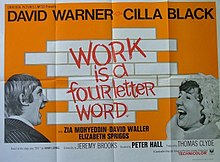Work Is a Four-Letter Word
| Work Is a Four-Letter Word | |
|---|---|

Film poster
|
|
| Directed by | Peter Hall |
| Produced by | Thomas Clyde |
| Written by |
Henry Livings (original play) Jeremy Brooks (screenplay) |
| Starring |
David Warner Cilla Black Zia Mohyeddin David Waller Elizabeth Spriggs Alan Howard |
| Music by | Guy Woolfenden, Cilla Black, Delia Derbyshire |
| Cinematography | Gilbert Taylor |
| Edited by | Jack Harris |
|
Production
company |
Cavalcade Films
|
| Distributed by | Universal Pictures (USA) |
|
Release date
|
7 June 1968 (London), 25 September 1968 (USA) |
|
Running time
|
93 min |
| Country | UK |
| Language | English |
| Budget | $800,000 |
Work Is a Four-Letter Word (also known as Work Is a 4-Letter Word) is a 1968 British satirical comedy film starring David Warner and Cilla Black, in her only acting role in a cinematic film. The film, which directed by Peter Hall, was not well received by critics even though it was based on the award-winning play Eh?. It also marked the acting debut of Elizabeth Spriggs.
Everyone is employed by the ultra-modern DICE Corporation but Valentine Brose (Warner) would rather stay at home to tend his psychedelic mushrooms. However, his bedroom is too small and his fiancee Betty Dorrick (Black) wants him to settle down. Accordingly, Brose seeks a job in DICE's boiler-room, a suitable environment to grow his mushrooms.
The plot describes his attempts to get the job, and the conflicts with middle-management, including the personnel manager, Mrs Murray (Spriggs, in her first film role). Having obtained it, Brose is more interested in his mushrooms than tending the boiler, with unforeseen results including a major power cut. The boiler room contains a computer (for some reason), which towards the end of the film is also breaking down.
Brose eventually marries Betty, but is more interested in having her sweep up the boiler room so he can concentrate on his first love, the mushrooms. Eventually he goes and the film ends with Brose and Betty loading up a pram with mushrooms and escaping.
The screenplay was written by Jeremy Brooks who adapted it the play Eh? by Henry Livings. It premiered in New York City in 16 October 1966. Livings won an Obie Award for Best Play the same year.
David Warner had established a reputation for playing off-beat roles, including the title role in Morgan: A Suitable Case For Treatment (1966) and was a member of the Royal Shakespeare Company, of which Peter Hall was artistic director until the year of the film's release.
...
Wikipedia
